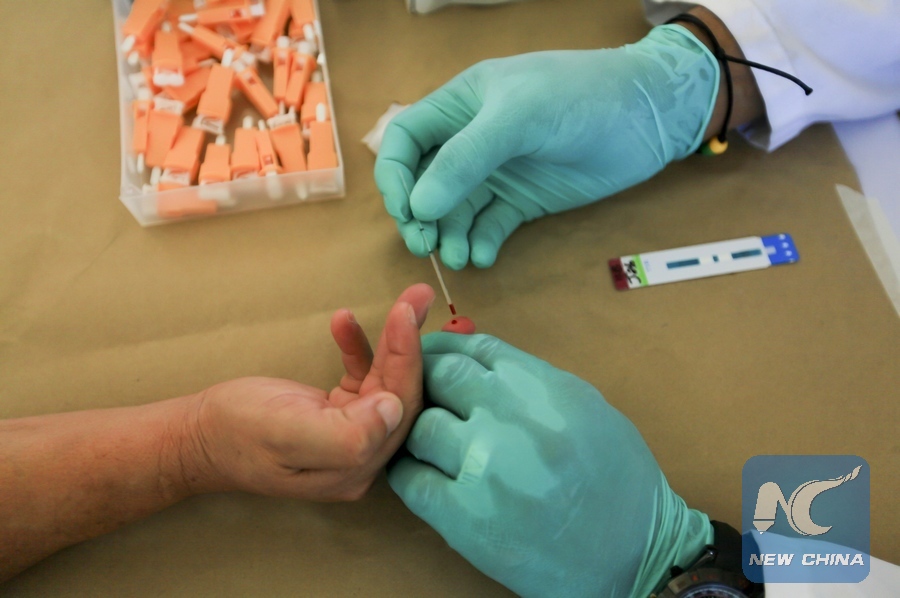
A person takes an instant HIV/AIDS detection test during an activity on the World AIDS Day in Tegucigalpa, capital of Honduras, on Dec. 1, 2016. (Xinhua/Rafael Ochoa)
by David Kashiki
LUSAKA, Aug. 18 (Xinhua) -- Debate on whether the Zambian government should rescind its decision to make HIV testing a mandatory policy has heightened, with many men and women taking opposite stances.
On Tuesday, President Edgar Lungu, during the launch of the HIV Testing, Counseling and Treatment (HTCT), said the epidemic posed a serious threat to the country's development hence the government's decision to mitigate the scourge by making testing of the virus, compulsory for all patients that visit health centers.
"The HIV scourge has continued to pose one of the biggest threats to our country's development," he said.
According to the Ministry of Health, as of 2016, about 1.2 million people or 12.9 percent of the Zambian population were living with the HIV virus, with 63 percent of them on antiretroviral treatment.
Susan Mulenga, a mother of three and resident of Makeni Township in Lusaka, the country's capital, said women were not frightened by the declaration.
"I don't think I'm affected by this. For me, HIV testing has been part of my life. I test for the virus each time I go for antenatal. For us women, testing for HIV has been mandatory for some time now. So, this decision does not scare me at all," Mulenga said.
She however feels men needed to be coerced to go for HIV testing if the fight against HIV/AIDS is to be a success.
"There is need to protect the next generation and we are doing this for the generations we are giving birth to. This is a good move, and we must support it at all cost so that one day, we have an HIV free Zambia," she added.
But Melvin Hantuba, another male resident from the country's capital, expressed displeasure at the government's decision. Like him, A number of men interviewed in the Zambian capital were against the decision to conduct mandatory HIV testing.
"This is not correct. We cannot be forced to test for HIV against our will. We should remain with the rights to decide when we go for a test," he said.
According to him, people will shun going to hospitals each time they are sick as some may not be psychologically prepared to undergo mandatory HIV tests.
Angel Mfula, another Lusaka resident said the government should tackle high poverty levels in the country which was one of the factors fueling the spread of HIV/AIDS.
"Our government should fight HIV by reducing poverty levels. Many women today are prostituting in exchange for money. They need to feed their families," he said.
The country's human rights body, the Human Rights Commission (HRC), has since called on the government to revisit its decision.
"The HRC would like to particularly call upon the government to revisit the recent policy pronouncement on mandatory HIV testing because it is in conflict with the internationally agreed principles and practices on reducing the spread of HIV and mitigating the impact of AIDS," Mudford Mwandenga, the chairperson of the human rights body said in a statement.
The government, he said, should adhere to the United Nations (UN) guideline on HIV testing and counseling as articulated through the joint UN Program on AIDS (UNAIDS) and the World Health Organization (WHO) which discourages mandatory HIV testing on public health grounds and respect for human rights.
It was regrettable that government had formulated a policy that was in breach of international norms on HIV Testing and Counseling and in multiple violations of human rights such as the right to nondiscrimination, bodily integrity, and the right to be free from violation, the HRC said.
But the government believes that the move is right as it has been undertaken based on evidence.
Minister of Health Chitalu Chilufya said over 1 million people have died from HIV/AIDS since the first case was announced in 1984 and that 81 percent of deaths recorded at the country's biggest hospital, the University Teaching Hospital (UTH), were HIV-related.

